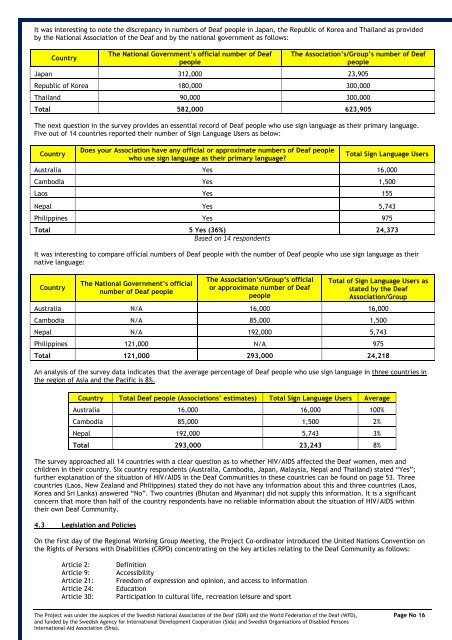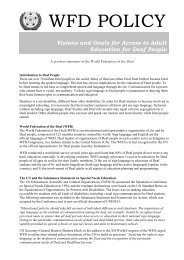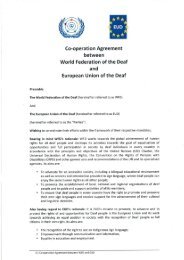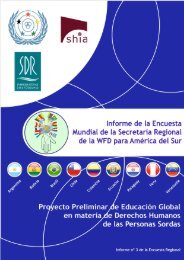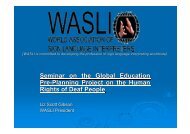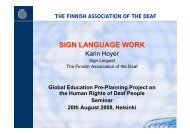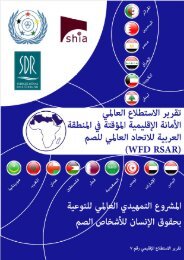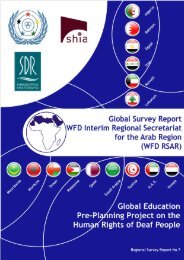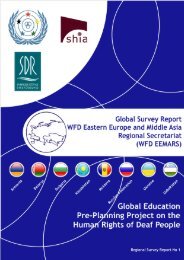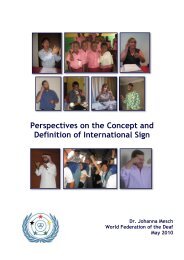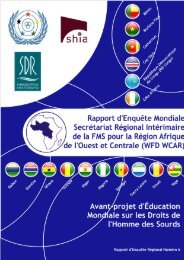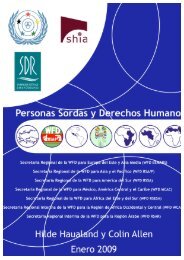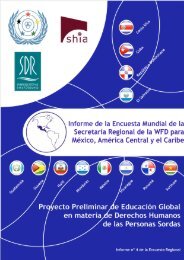RSA/P Regional Survey Report No 2 (English Version) PDF - World ...
RSA/P Regional Survey Report No 2 (English Version) PDF - World ...
RSA/P Regional Survey Report No 2 (English Version) PDF - World ...
Create successful ePaper yourself
Turn your PDF publications into a flip-book with our unique Google optimized e-Paper software.
It was interesting to note the discrepancy in numbers of Deaf people in Japan, the Republic of Korea and Thailand as provided<br />
by the National Association of the Deaf and by the national government as follows:<br />
Country<br />
The National Government’s official number of Deaf<br />
people<br />
The Association’s/Group’s number of Deaf<br />
people<br />
Japan 312,000 23,905<br />
Republic of Korea 180,000 300,000<br />
Thailand 90,000 300,000<br />
Total 582,000 623,905<br />
The next question in the survey provides an essential record of Deaf people who use sign language as their primary language.<br />
Five out of 14 countries reported their number of Sign Language Users as below:<br />
Country<br />
Does your Association have any official or approximate numbers of Deaf people<br />
who use sign language as their primary language?<br />
Total Sign Language Users<br />
Australia Yes 16,000<br />
Cambodia Yes 1,500<br />
Laos Yes 155<br />
Nepal Yes 5,743<br />
Philippines Yes 975<br />
Total 5 Yes (36%) 24,373<br />
Based on 14 respondents<br />
It was interesting to compare official numbers of Deaf people with the number of Deaf people who use sign language as their<br />
native language:<br />
Country<br />
The National Government’s official<br />
number of Deaf people<br />
The Association’s/Group’s official<br />
or approximate number of Deaf<br />
people<br />
Total of Sign Language Users as<br />
stated by the Deaf<br />
Association/Group<br />
Australia N/A 16,000 16,000<br />
Cambodia N/A 85,000 1,500<br />
Nepal N/A 192,000 5,743<br />
Philippines 121,000 N/A 975<br />
Total 121,000 293,000 24,218<br />
An analysis of the survey data indicates that the average percentage of Deaf people who use sign language in three countries in<br />
the region of Asia and the Pacific is 8%.<br />
Country Total Deaf people (Associations’ estimates) Total Sign Language Users Average<br />
Australia 16,000 16,000 100%<br />
Cambodia 85,000 1,500 2%<br />
Nepal 192,000 5,743 3%<br />
Total 293,000 23,243 8%<br />
The survey approached all 14 countries with a clear question as to whether HIV/AIDS affected the Deaf women, men and<br />
children in their country. Six country respondents (Australia, Cambodia, Japan, Malaysia, Nepal and Thailand) stated “Yes”;<br />
further explanation of the situation of HIV/AIDS in the Deaf Communities in these countries can be found on page 53. Three<br />
countries (Laos, New Zealand and Philippines) stated they do not have any information about this and three countries (Laos,<br />
Korea and Sri Lanka) answered “<strong>No</strong>”. Two countries (Bhutan and Myanmar) did not supply this information. It is a significant<br />
concern that more than half of the country respondents have no reliable information about the situation of HIV/AIDS within<br />
their own Deaf Community.<br />
4.3 Legislation and Policies<br />
On the first day of the <strong>Regional</strong> Working Group Meeting, the Project Co-ordinator introduced the United Nations Convention on<br />
the Rights of Persons with Disabilities (CRPD) concentrating on the key articles relating to the Deaf Community as follows:<br />
Article 2:<br />
Article 9:<br />
Article 21:<br />
Article 24:<br />
Article 30:<br />
Definition<br />
Accessibility<br />
Freedom of expression and opinion, and access to information<br />
Education<br />
Participation in cultural life, recreation leisure and sport<br />
The Project was under the auspices of the Swedish National Association of the Deaf (SDR) and the <strong>World</strong> Federation of the Deaf (WFD), Page <strong>No</strong> 16<br />
and funded by the Swedish Agency for International Development Cooperation (Sida) and Swedish Organisations of Disabled Persons<br />
International Aid Association (Shia).


